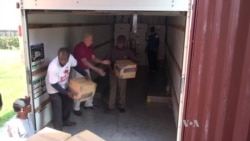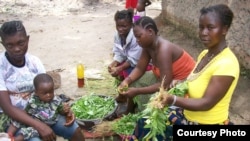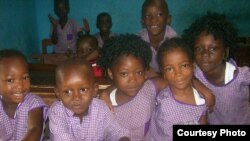Seventy-five dollars will fill up a gas tank in a big sports utility vehicle or pay for a family’s casual dinner in the United States. But in a typical African village $75 can help a village break out of the cycle of poverty.
“Seventy-five dollars is enough capital for someone in a village in Nigeria to start a local business,” says Chris Egbulem, founder of the volunteer organization, Action Africa. “This woman who has received the $75 is able to employ a second person, maybe a third, and, by saving some money, to compensate them enough for them to start their own business across the town.”
Egbulem, who grew up in Nigeria, was a long time graduate school professor in Louisiana. But now, he devotes himself to creating sustainable solutions for impoverished people in sub-Saharan Africa, one village at a time. Action Africa focuses primarily in Nigeria, Africa’s most populous country, and Sierra Leone, one of the poorest countries in the world.
Sierra Leone mudslides
Recently, Egbulem received news that heavy rains had created mudslides outside of Sierra Leone’s capital, Freetown, burying homes and people.
“We have heard about 500 bodies recovered, 600 bodies,” Egbulem says. “But we know from experience that when things like this happen, you have to multiply that number by two or three because a lot of people are still unaccounted for so that maybe 1,000 people have perished in this disaster.”
Egbulem was right about the numbers. The mudslide death toll did rise to about 1,000. But he did not wait to be proven right to take action. Egbulem and Action Africa quickly rallied to help the survivors of the disaster, collecting medical supplies and clothing for victims.
But emergency relief is only part of what Action Africa does.
Helping immigrants
Egbulem founded the Washington, D.C.-based non-profit organization in 2000 to help new African immigrants assimilate into American society. At first he worked out of his home, but later moved to devote the entire house to Action Africa.
The organization provides food to newly arrived African families and helps them find jobs.
Egbulem has an ulterior motive in helping immigrants: he wants to inspire them to reach back to their African roots and help villagers in Africa become self-sufficient.
“We want to start with the health program so that people are able to rise to their feet, be well enough to have a voice," he says. "Then we go into the educational part so that the children and their parents will know a little bit better to pursue their goals. And we want to empower the adults with a micro-enterprise support program.”
The group especially focuses on empowering women.
“Women are very grounded, hard-working entrepreneurs, and we know that when we work with them, they tend to pull the community up much faster,” Egbulem says.
‘Happiness in my heart’
Before coming to the United States from Nigeria to earn his masters and doctoral degrees in culture studies and theology, Egbulem traveled across Africa, visiting 42 different countries.
“It's remembering what I had seen, and encountered, lived through my visit through so much of Africa that led me to think that there is more to me (to) succeed in here,” he says.
Egbulem plans to take his programs in Nigeria and Sierra Leone and expand them to other African countries. He says it is not necessary to go out there with some grandiose plan but rather to be ready to make a small but meaningful difference.
“When I see people given a fresh life because of the energy that we put in, that for me is the glory,” he says. “The joy on my neighbor’s face is the happiness in my heart.”







